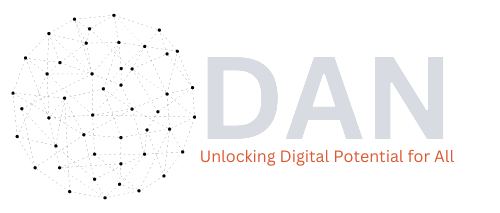Services

Needs Assessment
We conduct thorough needs assessments to understand the specific challenges and
requirements of the communities and target groups we aim to serve. This assessment helps us tailor our programs and initiatives to meet their unique needs and maximize the impact of our interventions.

Collaboration and Partnerships
We believe in the power of collaboration and actively seek partnerships
with government agencies, NGOs, educational institutions, technology providers, and other stakeholders.
By working together, we leverage collective expertise, resources, and networks to enhance the reach and
effectiveness of our programs.

Comprehensive Training Programs
We develop comprehensive training
programs that cater to individuals from diverse backgrounds and sectors. We design these programs to be
accessible, practical, and adaptable to various learning styles. Our training initiatives cover a wide range of digital skills, from basic computer literacy to advanced topics such as data analysis and digital marketing.

Technology Access
We prioritize ensuring equitable access to technology resources. This includes
providing affordable access to devices such as computers, smartphones, and internet connectivity, particularly in underserved communities and rural areas. We explore innovative approaches such as mobile technology, community centers, and partnerships with local businesses to extend technology
access.

Inclusive Outreach
We actively work to reach and empower
marginalized groups. We design programs and initiatives that consider the unique challenges faced by women, individuals with disabilities, and minority communities. By fostering an inclusive environment, we aim to create equal opportunities for all and promote diversity in the digital landscape.

Continuous Learning and Adaptation
We embrace a culture of continuous learning and adaptation. We
constantly evaluate the effectiveness of our programs, gather feedback from beneficiaries and
stakeholders, and incorporate those insights into program enhancements. This ensures that our
interventions remain relevant, impactful, and responsive to the evolving needs of the digital landscape.

Advocacy and Policy Engagement
We engage in advocacy efforts to raise
awareness about the digital divide and influence policies that promote digital inclusion. We actively participate in policy discussions, collaborate with government bodies, and advocate for policies that
prioritize equitable access to technology, digital skills training, and resources.

Monitoring and Evaluation
We implement robust monitoring and evaluation mechanisms to assess the
impact of our programs and initiatives. By collecting data, measuring outcomes, and analyzing results, we can continuously improve our interventions, make data-driven decisions, and demonstrate the
effectiveness of our efforts.
Support our initiative
Work With Us
Help us empower individuals from various sectors by providing them with the necessary digital skills to enhance their work efficiency, stay relevant in a rapidly evolving technological landscape, and unlock new opportunities.





